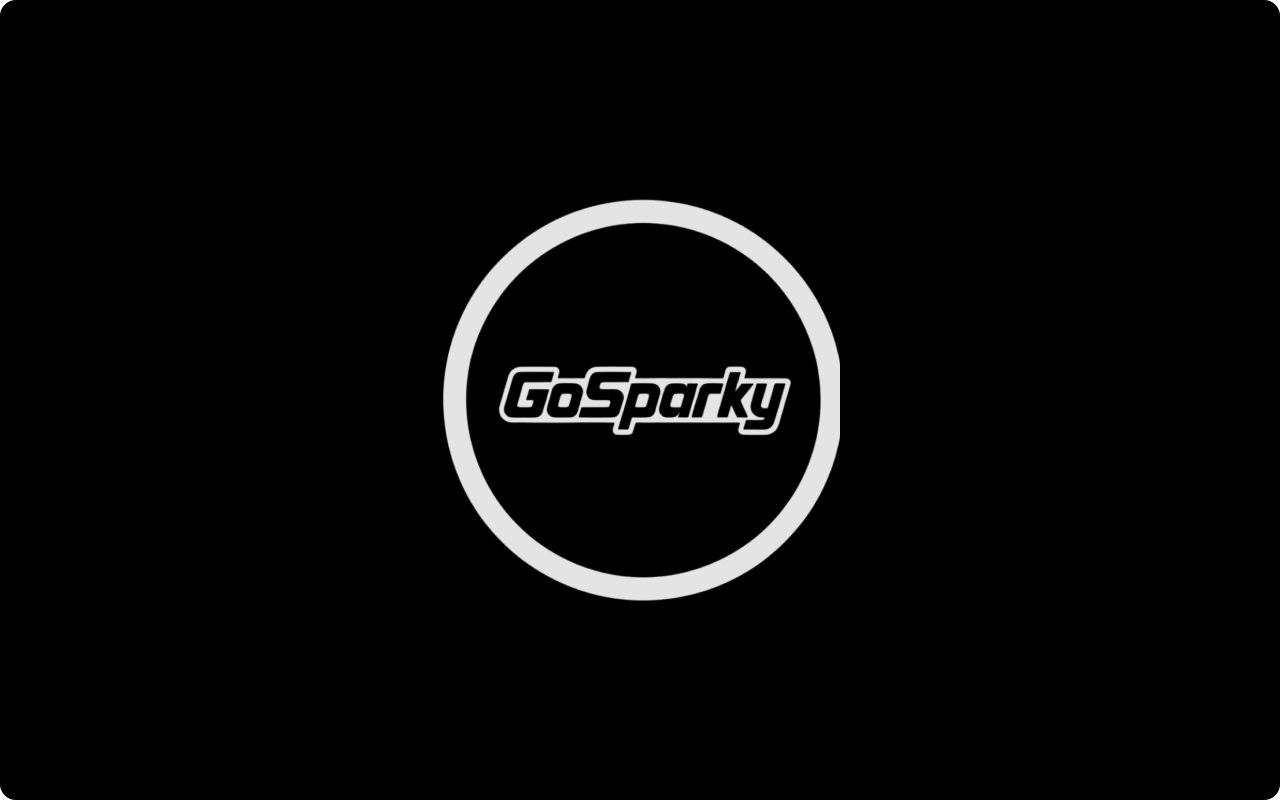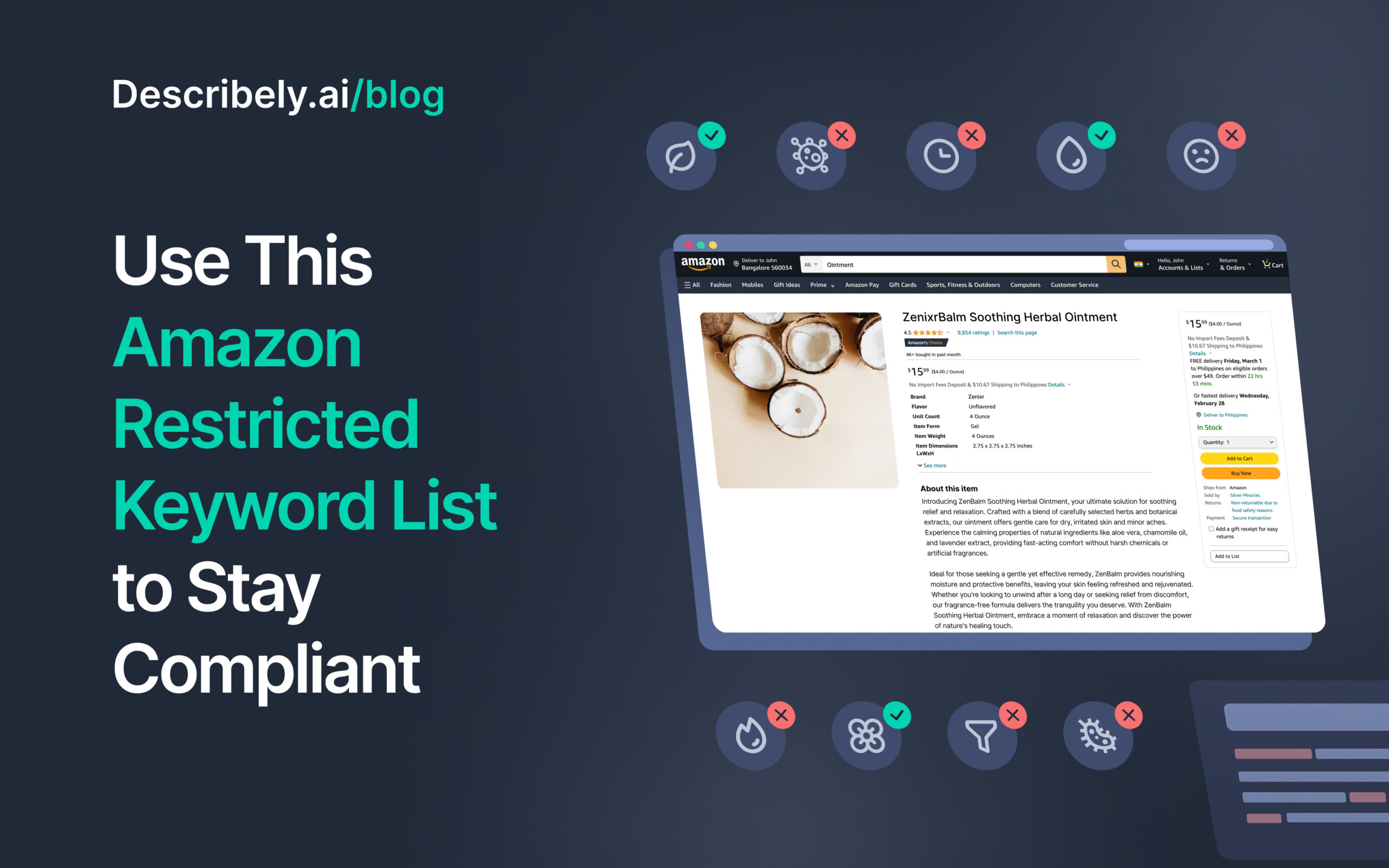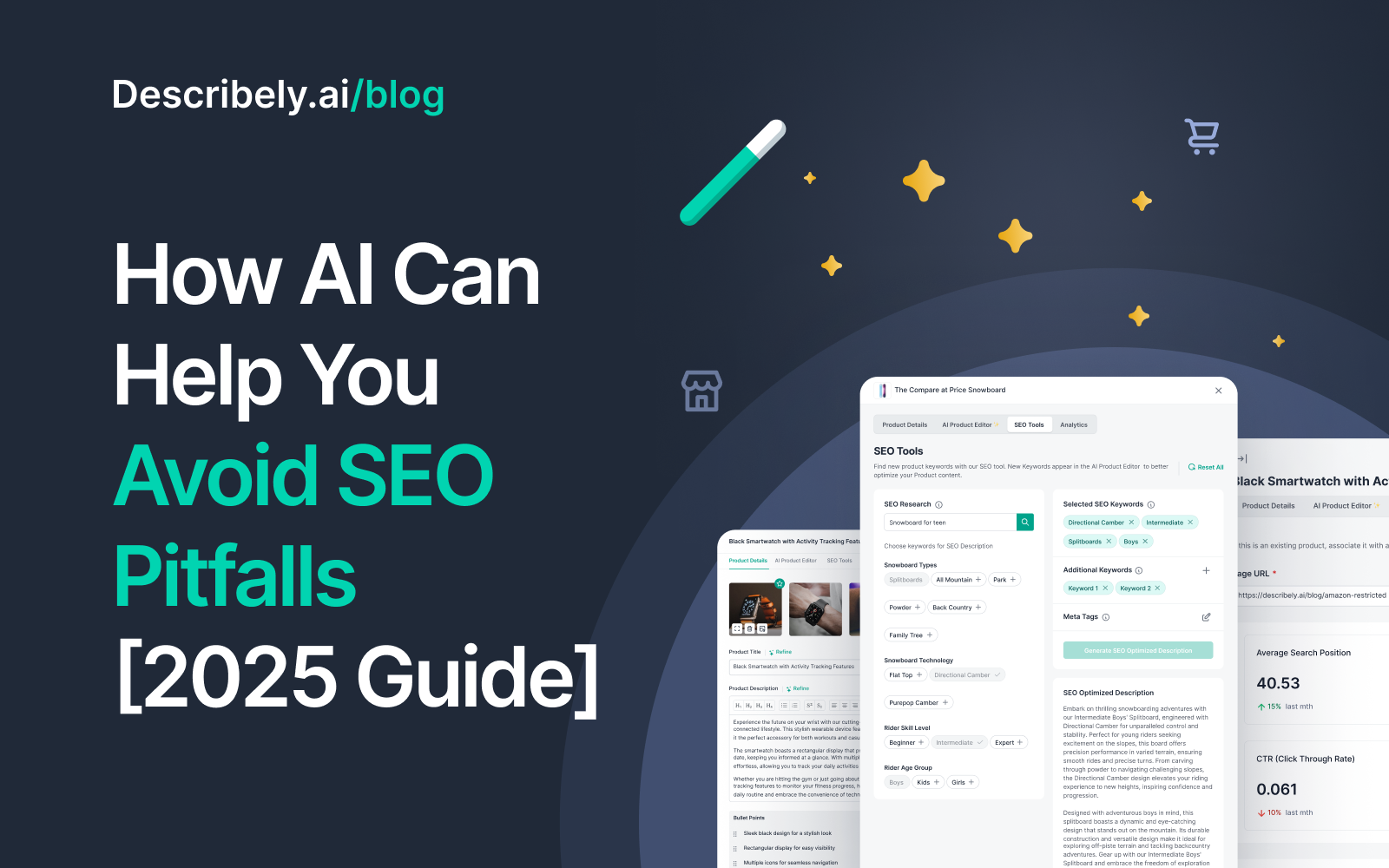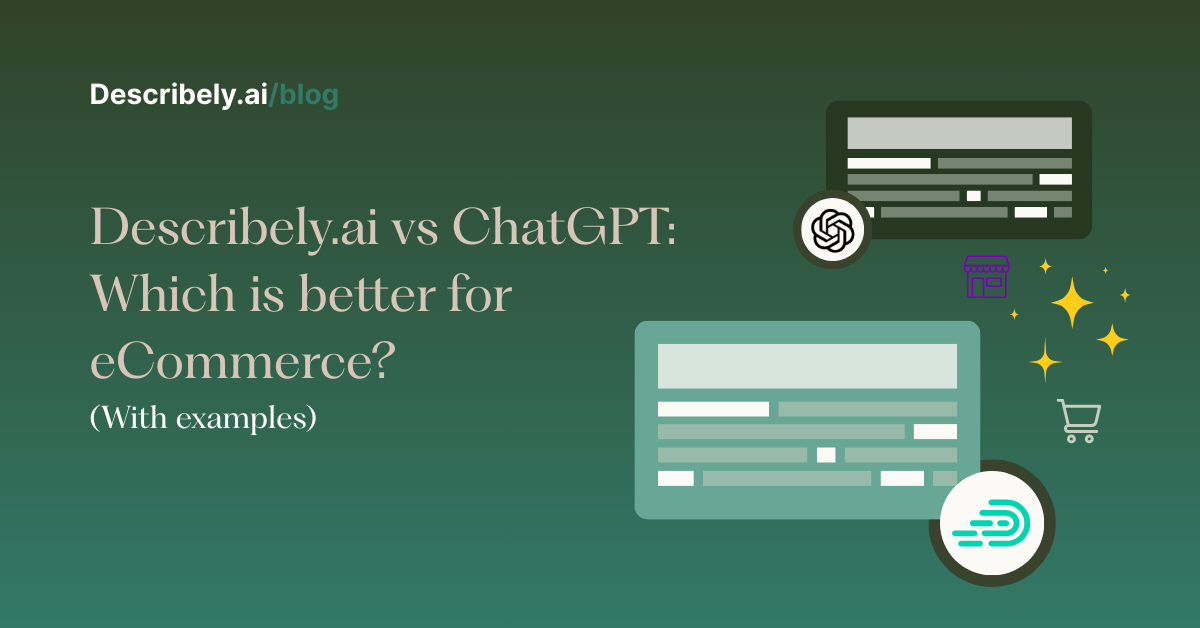
Describely.ai vs ChatGPT: Which is better for eCommerce? (With examples)
If you’re looking to automate product descriptions, meta descriptions, tags, and more eCommerce content, you probably tried AI tools like ChatGPT. You’ve tested and seen the huge time saver it can be, but also the many revisions it takes to get it right.
It sometimes takes longer to test AI prompts than to manually write the product description. So, should you stop at ChatGPT, or are there better options out there for eCommerce specifically?
That’s why we’re comparing Describely and ChatGPT in this full guide. Below you’ll get the full picture as well as product examples to see which one adapts better to your eCommerce content workflow.
AI Copywriting Tools for eCommerce: Describely or ChatGPT?
The first difference to keep in mind is: most platforms are not* AI copywriting tools and this includes ChatGPT— at least by default.
Rather, they’re AI writing copilots that help you generate content ideas. They’re not meant to be final versions and will require revisions. Generic AIs aren’t designed for eCommerce copywriting.
Instead, you’d need a tool that can do the following:
- Separately generate product descriptions, titles, bullet points, keywords, or meta-descriptions
- Generate hundreds of product pages at once with your brand guidelines
- Enrich sparse product details with official supplier data
- Optimize for SEO and avoid keywords that are restricted on eCommerce marketplaces
- And most importantly, achieve all of these in as fewest steps as possible
ChatGPT can do some of this IF you’re ready for hours of trial and error. This is where tools like Describely.ai excel for effortless data enrichment and product descriptions at scale.
Without reading further we recommend you go with Describely AI to finally catch up with your product content backlog. Want to know why? Below are all the details.
Only have a few minutes? Watch our quick video below, or keep reading for a more in-depth analysis
ChatGPT Overview

Arguably the most popular AI tool today is ChatGPT by OpenAI. Whether you’re creating AI product descriptions, writing novels, or debugging code, ChatGPT has use cases for everyone.
Most platforms have third-party integrations for ChatGPT. The newest versions also include community-created prompts, live browsing, file attachments, and more. But the basics haven’t changed:
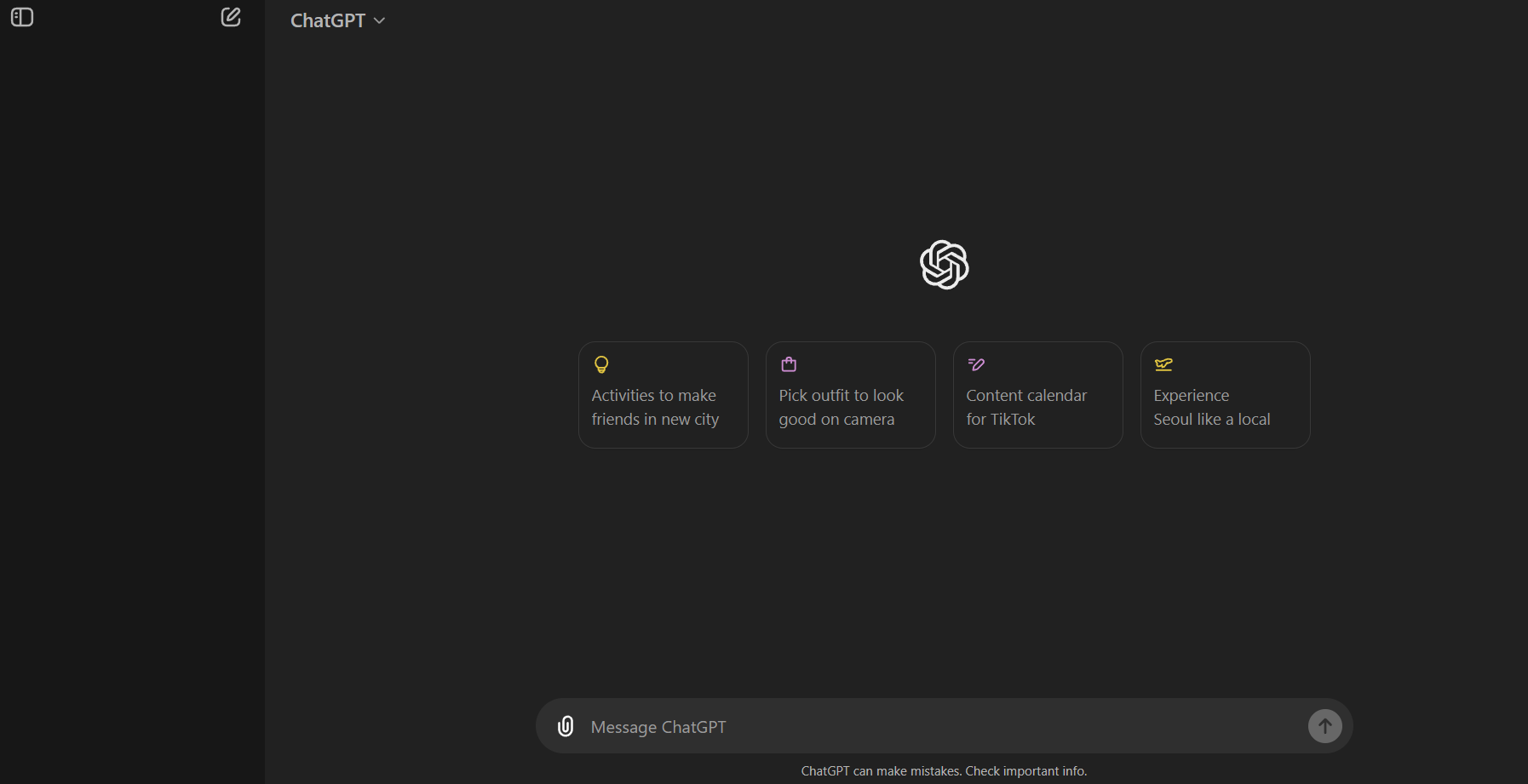
You enter a detailed prompt on the chat page, and unique content will appear within seconds.

For better results, you’d use custom instructions adapted for eCommerce copywriting.
Even though ChatGPT seems flexible, many users have found issues with complex prompts. As you get more specific, it often ignores some of your instructions unless they’re placed a certain way. That’s where trial and error begins.
Describely.ai Overview
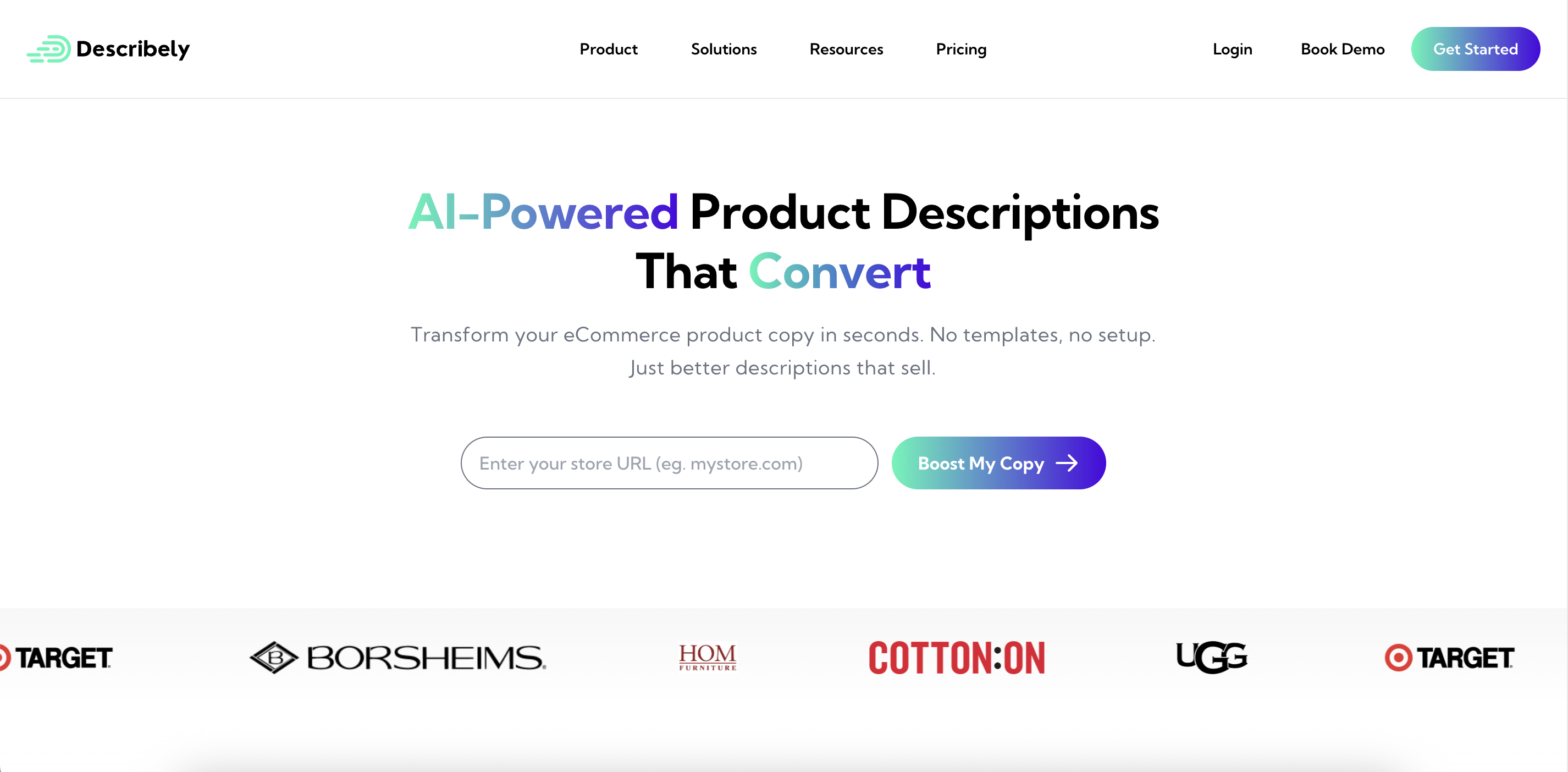
Describely is the AI product description generator for eCommerce teams, especially big box stores. Every feature is designed with the goal to speed up your eCommerce content process. You can, for example:
- Enrich, generate, or update 1000s of products at once
- Enrich their products with missing product data
- Also generate meta tags, and meta descriptions
- Optimize product copy for SEO using AI
- Keep your product descriptions on brand and accurate with Content Rules
- Recognize your brand voice from product description samples to save time on prompts and revisions
The result is an endless list of products generated and optimized within minutes.
So what is it like to get started?

After you sign up with Describely, you simply import directly from your store or a spreadsheet file. You can then customize rules like these and apply them in bulk:

And if you just want to test Describely with one product, this is the simplest method:

From a catalog, go to the + Add Product button and then select Create Product With AI

With as little as six words, Describely generates a full description that by default follows the eCommerce copywriting best practices:

That’s just one example of what you could do at scale with the right eCommerce AI tool.
Now let’s put it to the test!
Describely vs ChatGPT: eCommerce-Focused Use Cases Put to the Test
So how does Describely compare to ChatGPT with examples? Below we will test:
- Simple product descriptions
- Bulk product descriptions
- Enriching product descriptions with sparse details
- Optimizing product meta-descriptions
- Optimizing product keywords for SEO and marketplace guidelines
We’ll be using simple prompts and minimal customization just to compare the AI potential by default.
And we’re looking for things like:
- Accurately following instructions
- Avoiding repetition or keyword stuffing
- Unique, natural language
- Consistency and simplicity
Let’s dive in!
AI Copywriting for Product Descriptions
Let’s start the first example with the basics. What’s the simplest way possible to create an effective product description on each platform?
Example Prompt: Write a product description for “designer belt for women”
After writing this prompt on ChatGPT, you get something like this:
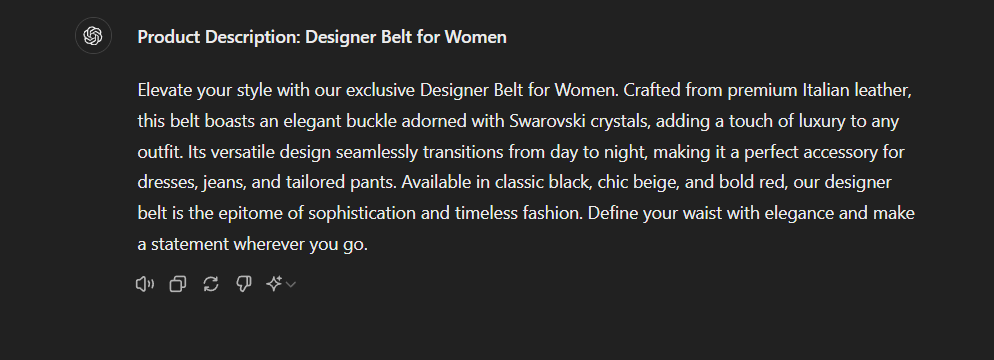
You can see it’s detailed and creative. Sometimes, ChatGPT adds extra features that your product may not have (the crystals, the colors…). This can lead to accuracy problems when you’re generating product content at scale.
With that said, it doesn’t sound repetitive or dull. It’s a good description.
Now to do it on Describely, we’ll just open a blank product page and write the title “designer belt.” If you keep the default rules and go to Generate, it creates this:

The first thing you see is that it covers all the elements of a product listing, including title optimization. The description also sounds convincing and accurate without made-up attributes.
Quality-wise, ChatGPT isn’t that far off from Describely. But when it comes to reliability, the Describely descriptions are more accurate.
AI Copywriting for Generating Product Descriptions for a Large Backlog of Products (bulk generation)
As an eCommerce marketing team, you might have hundreds of products to write every week. How can you get this done without having to go one by one?
On ChatGPT, you have a character limit of 25,000, which is about 15 to 20 product descriptions at most. And the premium plans still have daily generation limits.
ChatGPT bulk generation is difficult but not impossible:
Example Prompt: Create five full product descriptions:
- 2-tier farmhouse coffee table
- Coffee table, black, 3-tiers
- low-height wooden coffee table
- Round coffee table, black, 2-tiers
- Round coffee table, white
From one prompt, below are five descriptions for similar products:

As you can see, ChatGPT doesn’t lack creativity. Even for almost identical products, it came up with unique names and descriptions.
Still, the titles and bullet points could be more optimized.
To do it on Describely, we created five blank product pages with the same titles:
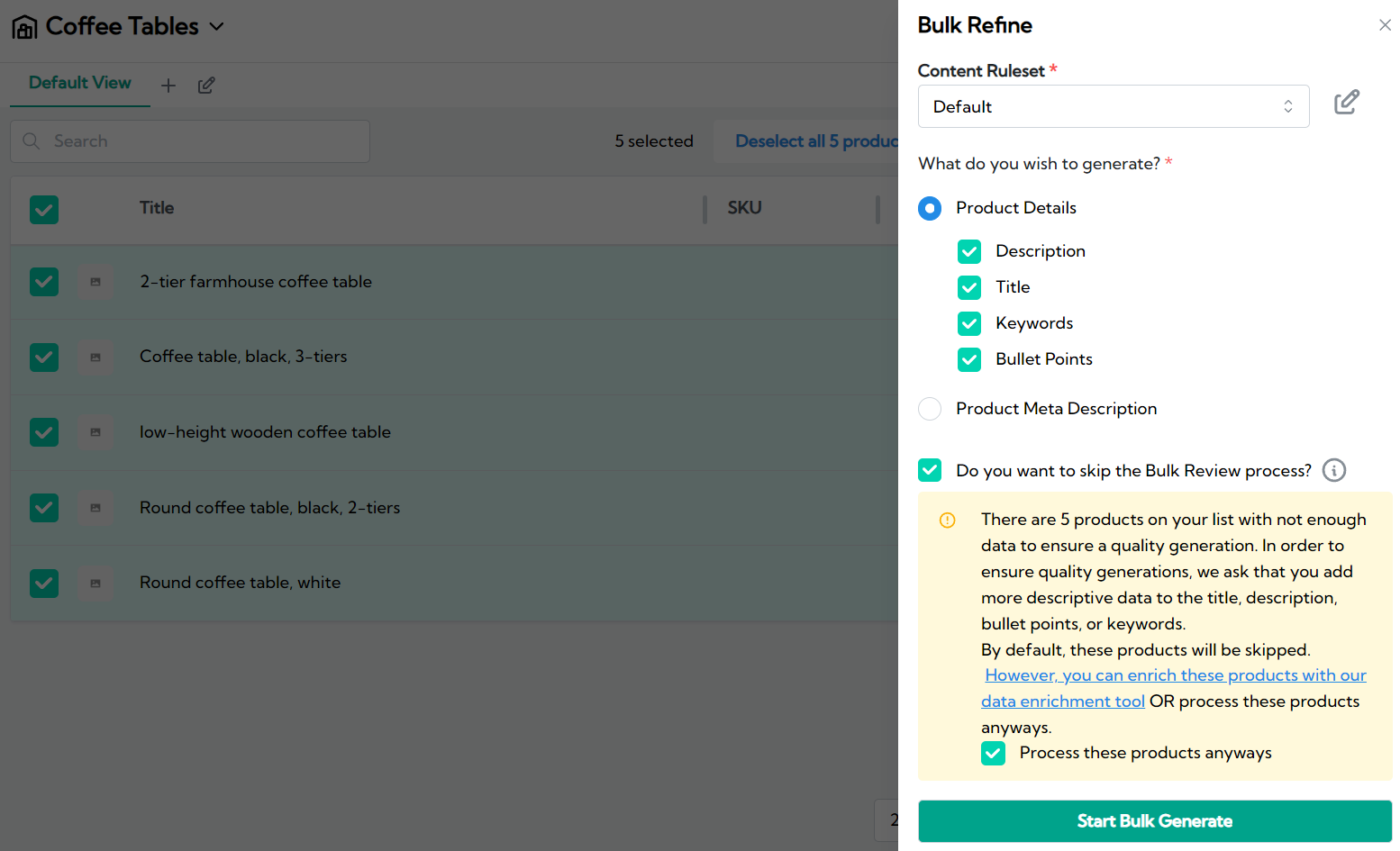
We selected all five for bulk generation and here’s the result:

As in the screenshot, Describely generated all five descriptions and elements organized by columns (one for titles, another one for descriptions, bullet points, keywords, meta-descriptions…).
The differences are minor, but Describely descriptions use simpler and more specific language. Each description sounds original and can be edited directly, which isn’t possible on ChatGPT.

And if it works with 5 products at once, it works with 1,000! Describely works better for mass product content.
AI for Enriching Products With Sparse Details (product data enrichment)
A big bottleneck to AI content generation is data research. Whether you have 1,000+ products or just a few, there will be some that you can’t generate accurately unless you find enough product attributes.
Luckily both ChatGPT and Describely can do this.
Suppose the product is a printer stand for the “HP LaserJet” model. You only have this name, and you lack all the information below (from the official website):
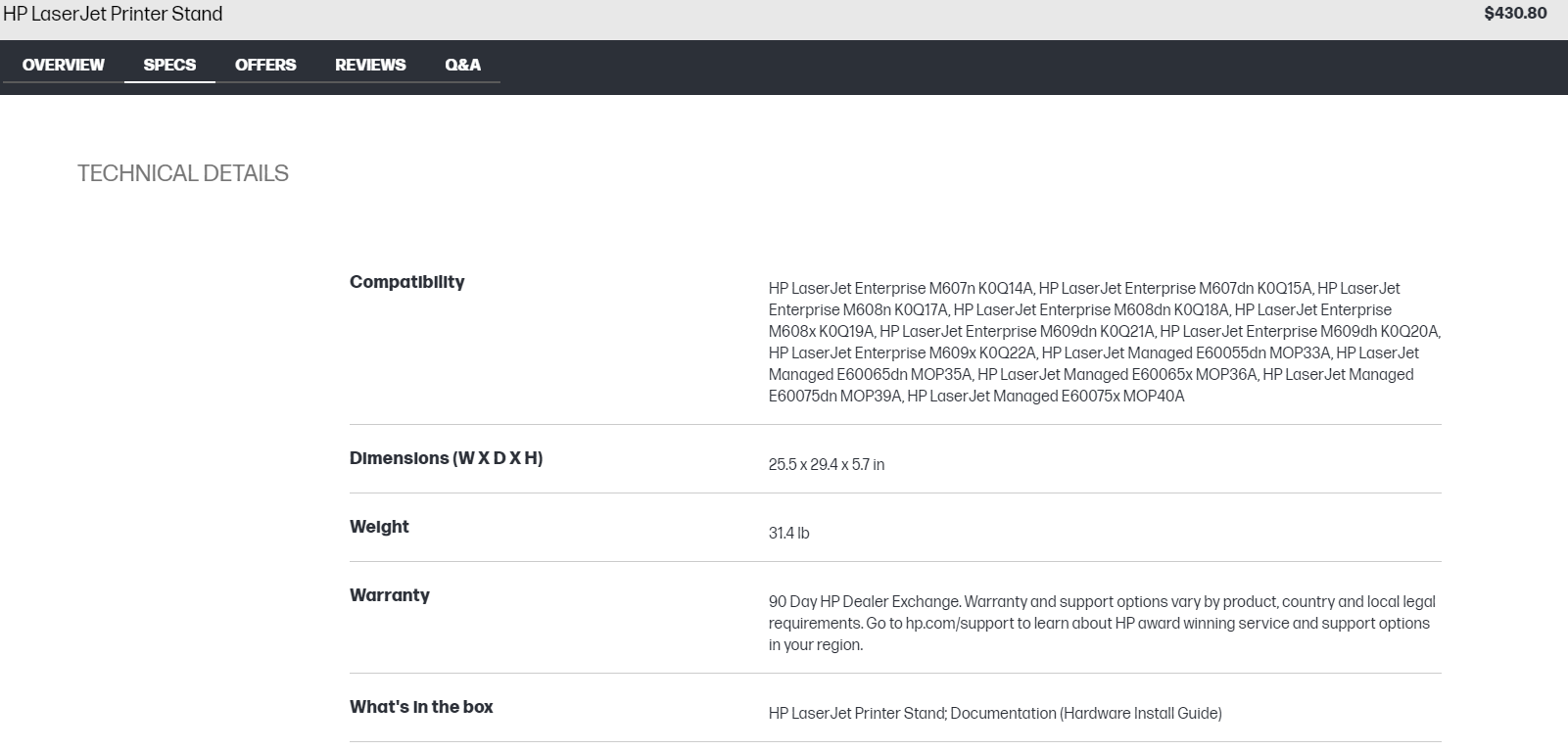
On ChatGPT, we can write:
Example Prompt: Find key attributes for the “HP LaserJet Printer Stand” from the official page hp.com
The response is fairly accurate:
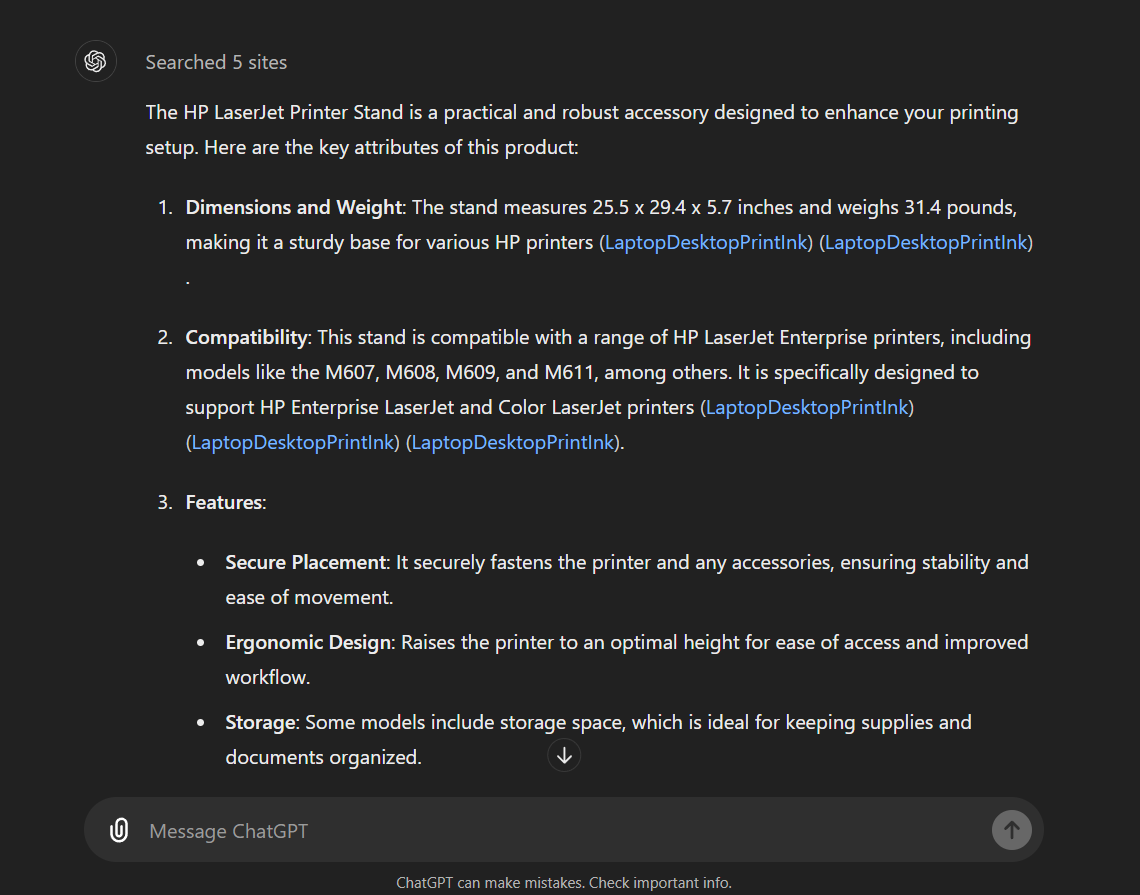
It retrieved more than enough information to write a complete product description. One improvement would be to not only get the data but also turn it into benefits. For example, the “31.4 pounds” could also mean “light-weight,” “sturdy,” or “stable.”
Which is what Describely did:

From just the title and website, it retrieved key attributes, recognized features, and also detected main keywords.
Here’s how we got there:

If you left the optional fields empty, Describely would have access to the entire Internet to find data about your product. As long as you have a specific title or the SKU, you’ll find accurate attributes without manually having to browse websites.
Another advantage of Describely over ChatGPT is being able to retrieve product data in bulk.
AI for SEO-Optimized eCommerce Meta-Descriptions
The meta-title and description are the first thing visitors see before going to the online store. And to be seen in the first place, it has to be keyword-optimized and concise. Ideally, it stands out from other results on page one.
Let’s test a few for an example product (luggage rack).
Example Prompt: Write an SEO-optimized meta-title and meta-description for “luggage rack”
On ChatGPT, this generates the following:

Will this meta-description get the job done? Yes.
Is it good enough to outrank top results? Probably not.
The language doesn’t sound as natural as in previous examples and some lines are generic (like the last one).
Let’s see how different Describely is:

No words are wasted. The title describes the product with an original name, main keyword, and key benefits. So does the description, and it’s short enough to fit for mobile searches.
And yes, Describely also supports meta-description generation in bulk. Simply select the products, go to Bulk Generation, select meta-descriptions, and it will generate something like this (previous product example):

AI for SEO Optimization
To set the right expectations, neither of these tools is a replacement for specialized SEO tools like Ahrefs, Semrush, or Frase.io. You’ll get better results using them together instead.
Still, both ChatGPT and Describely have basic SEO features to discover and insert keywords.
For example, let’s ask ChatGPT to brainstorm a few for the “luggage rack:”
Example Prompt: Discover relevant keywords for “luggage rack” and then include them in a product description
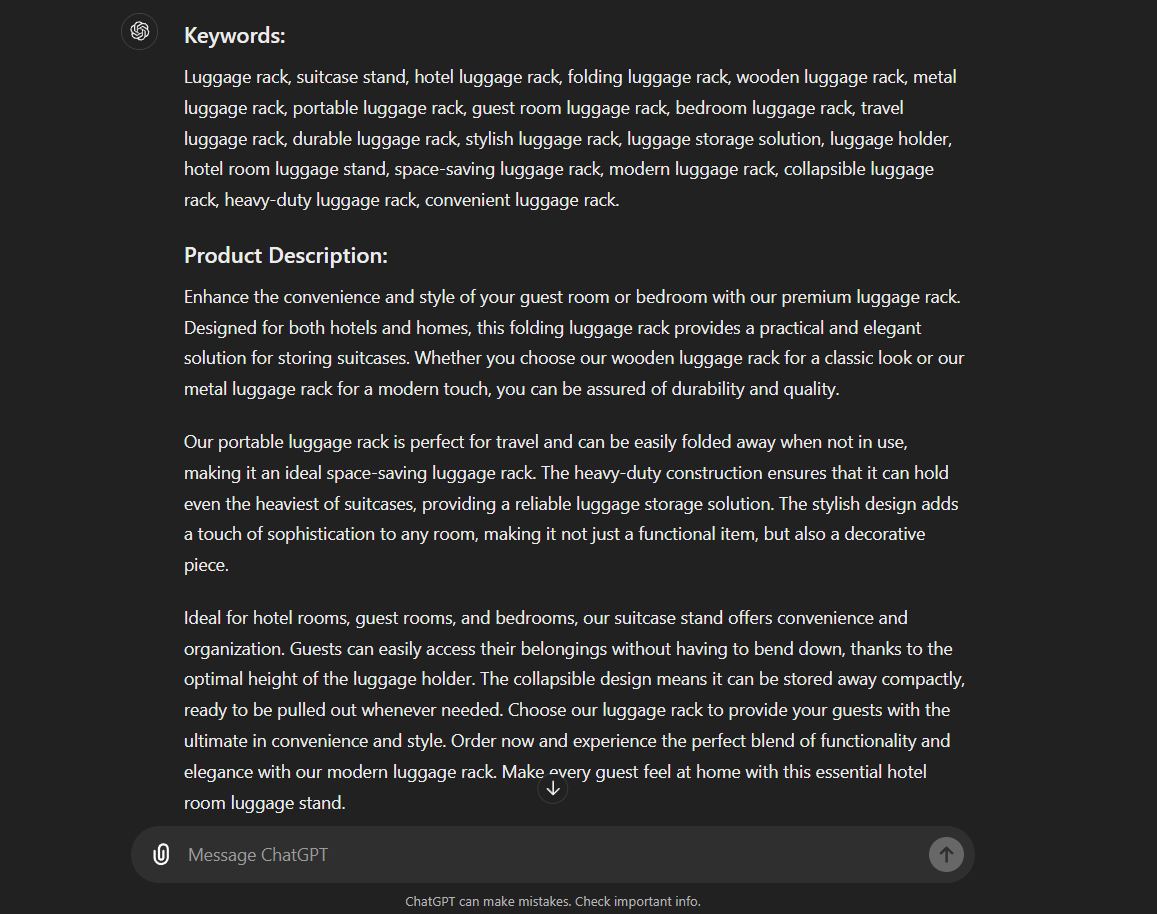
These are not secondary keywords. They’re long-tail keywords derived from “luggage rack,” which are harder to include naturally.
The content is too long and feels keyword-stuffed which Google penalizes. It might get searches, but it won’t get purchases.
Now, let’s test the SEO side of Describely:

From the product description page, you (1) go to SEO tools, (2) write the main keyword, (3) select secondary keywords, and then (4) “Generate SEO-Optimized Description.”
You can see it includes most of them without spamming “luggage rack” everywhere. If it doesn’t sound right, you can regenerate or edit directly and save.
And if you use keyword research tools, you can add them here directly before generating.
Describely outperforms ChatGPT both in keyword discovery and SEO writing.
Describely vs ChatGPT: Side-By-Side Comparison
Still on the fence? Below are 7 key factors to compare between Describely and ChatGPT.
Tone of Voice
It’s not enough to write natural content that doesn’t sound AI-written. To actually stand out and attract customers, it should also sound original and different from top competitors.
For example, let’s say we’re selling a “garlic press” where most competitor products use descriptions like this:
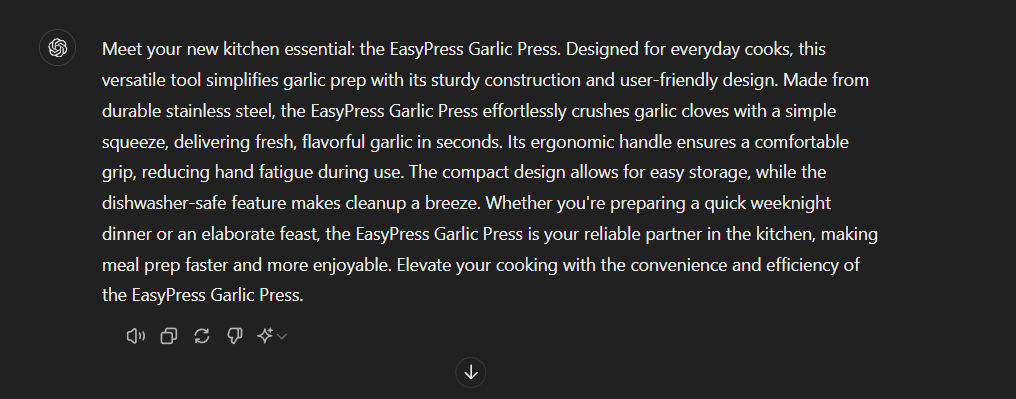
Below are two tone-of-voice examples to stand out:
- Aspirational, motivational, top-performance(like Nike)
- Luxurious, refined, high-status (like Gucci)
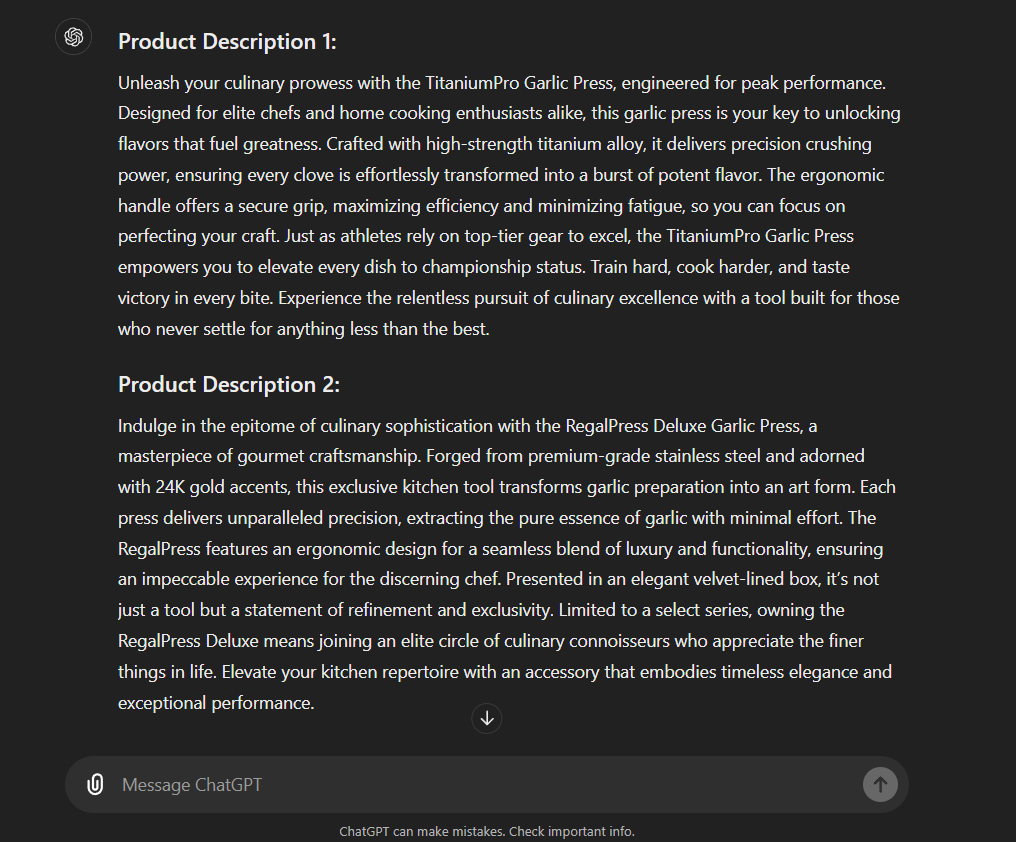
Notice how different both stories are for such a simple product. The ChatGPT descriptions are lengthy but high-contrast.
To do this on Describely, we created two custom tones of voice (aspirational and luxurious). If you put “garlic press” on a blank description and try both tones, this is what you get:
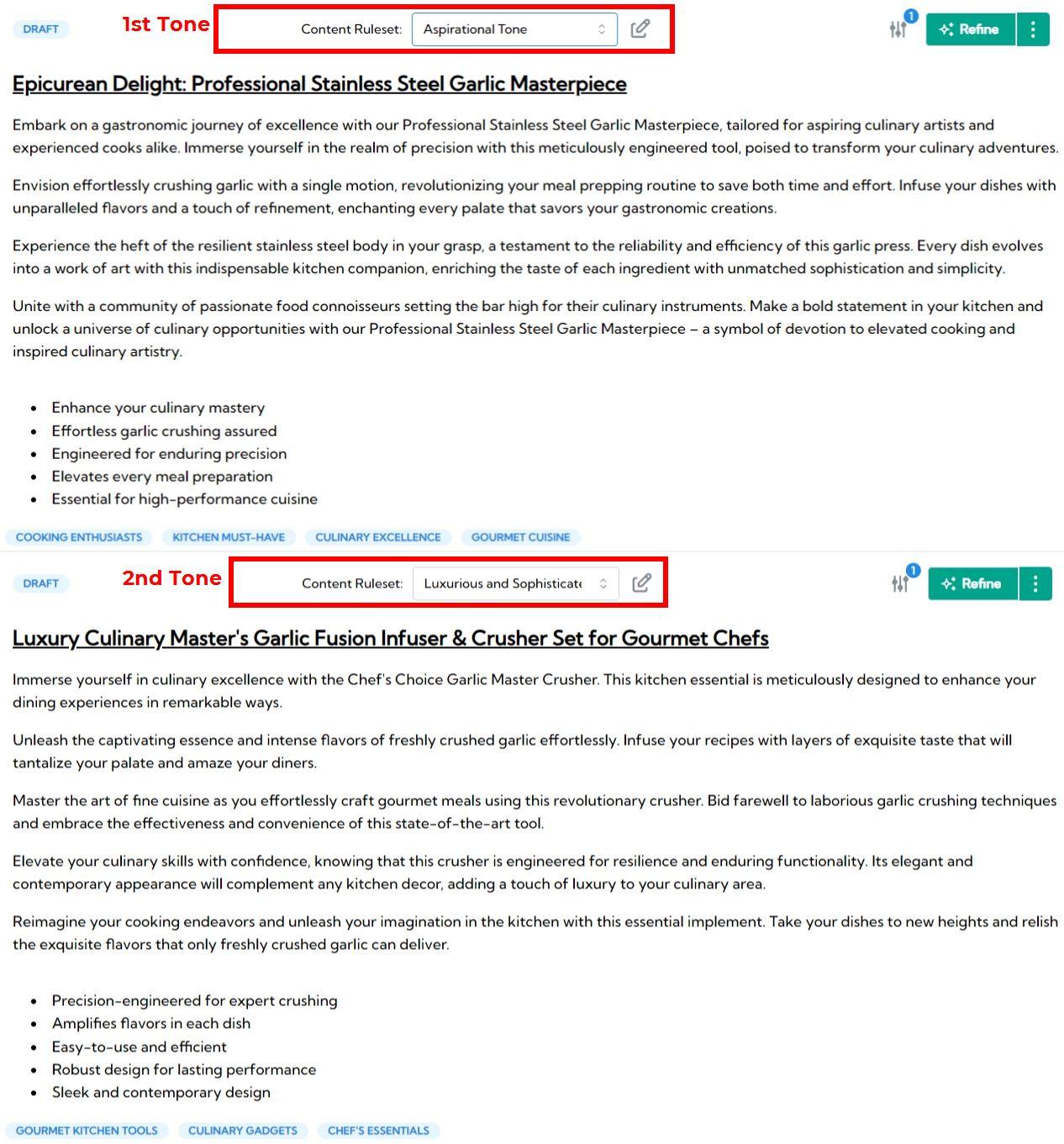
As shown above, Describely recognizes both styles to appeal to different buyers. It uses simpler words than ChatGPT so it doesn’t feel AI-written, the titles are specific, and the content is more scannable.
And what if you don’t know your tone of voice yet? Paste a description you like and Describely will find it for you:

Describely is a more complete brand-voice tool than ChatGPT.
Adherence to Brand Guidelines
Before writing AI product descriptions that sell, they first have to be approved for their eCommerce marketplace. There are stricter ones like Amazon that will suppress listings that include restricted keywords.
To avoid this, you could add a list of keywords to avoid in the custom instructions:
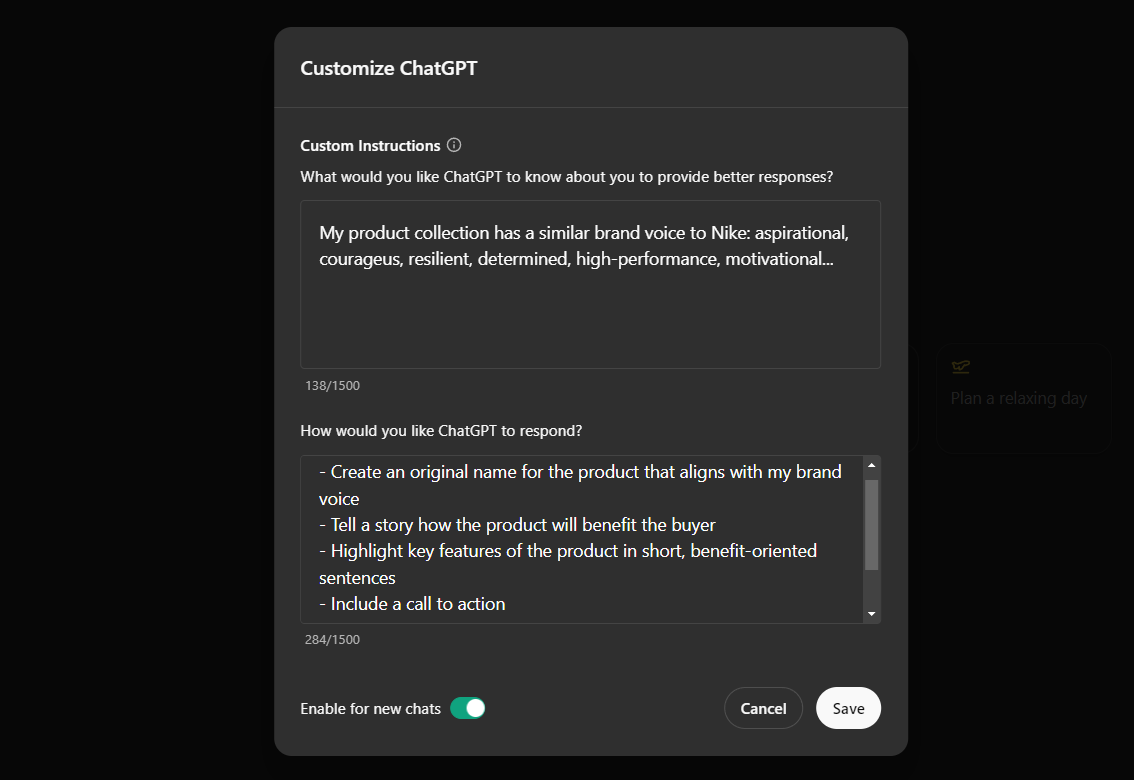
These are the only two fields to customize, and as you add more instructions, ChatGPT beComes less reliable. It can be done, but you should expect revisions.
On Describely, you just click one button:
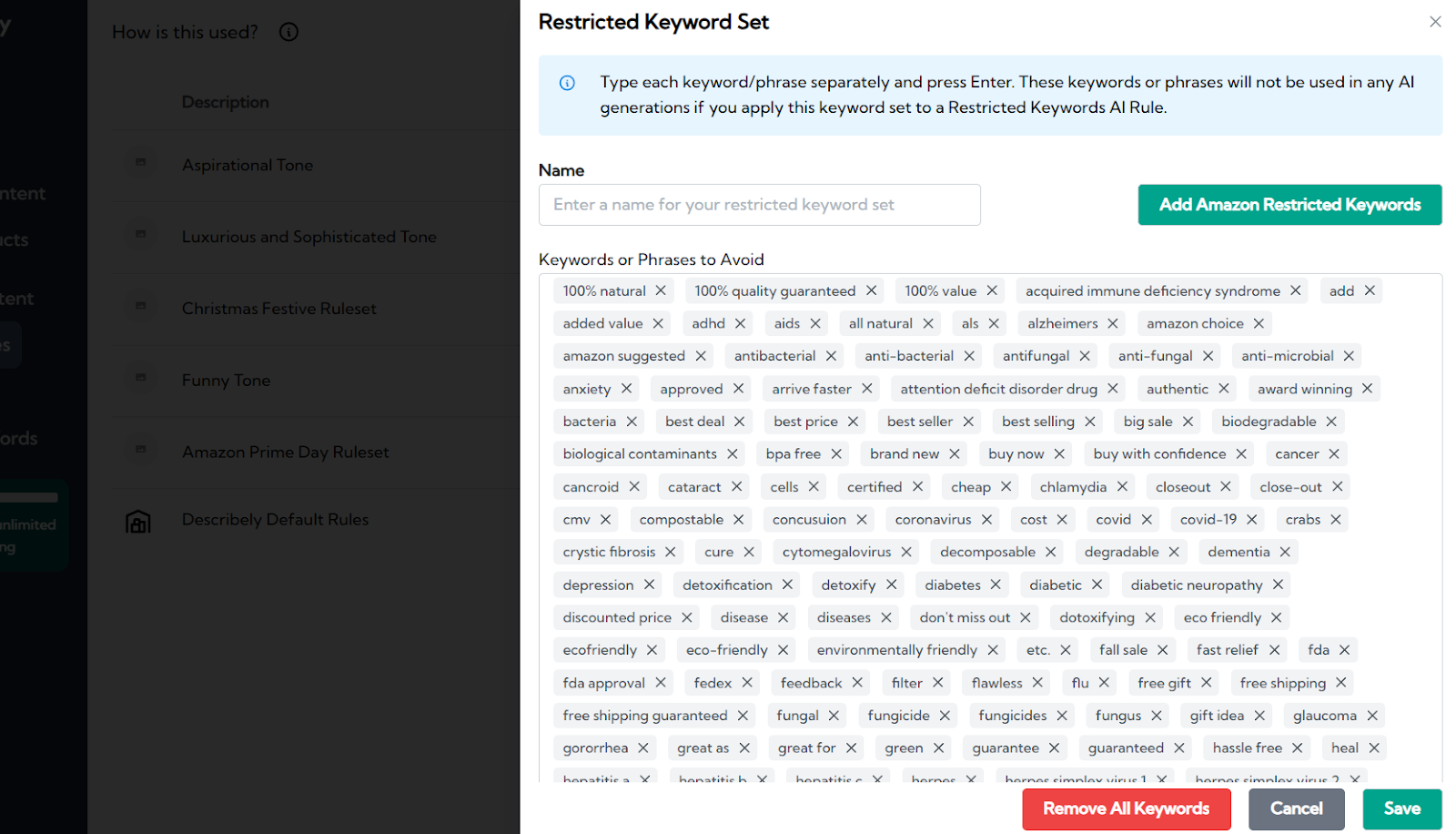
You can still add your own keywords, such as those from restricted categories, competitor names, or trademarked terms.
Need to update hundreds of outdated products? Add the keyword list to your content rules, and they’ll be ready in no time. You won’t have to individually change every page or make any changes in your store. Describely integrates with marketplaces like Shopify to update catalogs directly.
Product Description Quality
ChatGPT tends to be lengthier and use complex words whereas Describely is more scannable and conversational. To review that again, here’s a simple example for the product “underbed organizer:”
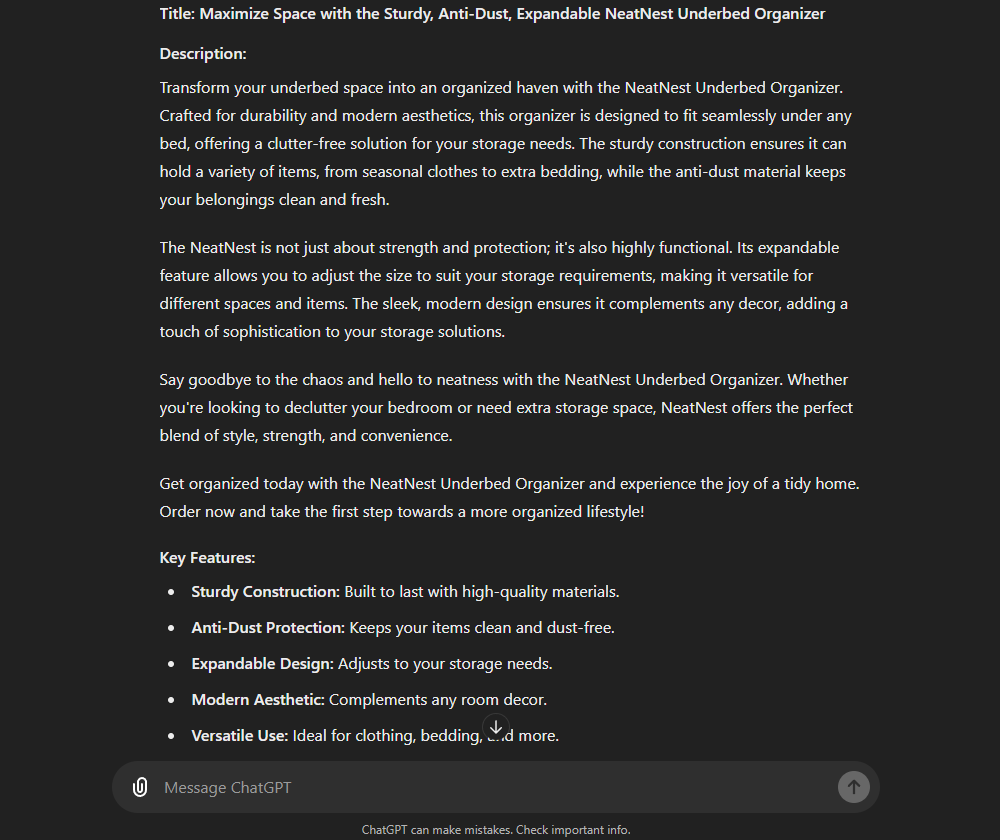
And on Describely, the output is this:

Another reason for this quality difference is the store integration. Describely pulls context from existing products to make new descriptions more consistent with the existing ones.
Ease of Use
ChatGPT is easy to use but hard to master. To reliably automate eCommerce content you may need the most complex prompts, but there are only 1,500 characters allowed.

These instructions aren’t organized either, so if the prompt doesn’t work it won’t be easy to change them.
Instead of adapting an all-in-one AI to eCommerce, Describely is already optimized for only that:

That’s why you won’t need lengthy instructions to get great AI product descriptions. Not to mention you can easily customize and edit, which ChatGPT doesn’t support.
Accessibility
As a widely used platform, ChatGPT has a lot of third-party integrations. This also means you need one plugin for every site, which can quickly turn into dozens of moving parts.
If you use ChatGPT directly (in-platform), you’ll also access AI rulesets made by other users:

Still, there’s no guarantee you’ll find a template that fits your unique store.
Describely might be platform-only, but everything is in one place. Anyone in your team can manage the content, data, and stores at the same time—without having to leave the page:
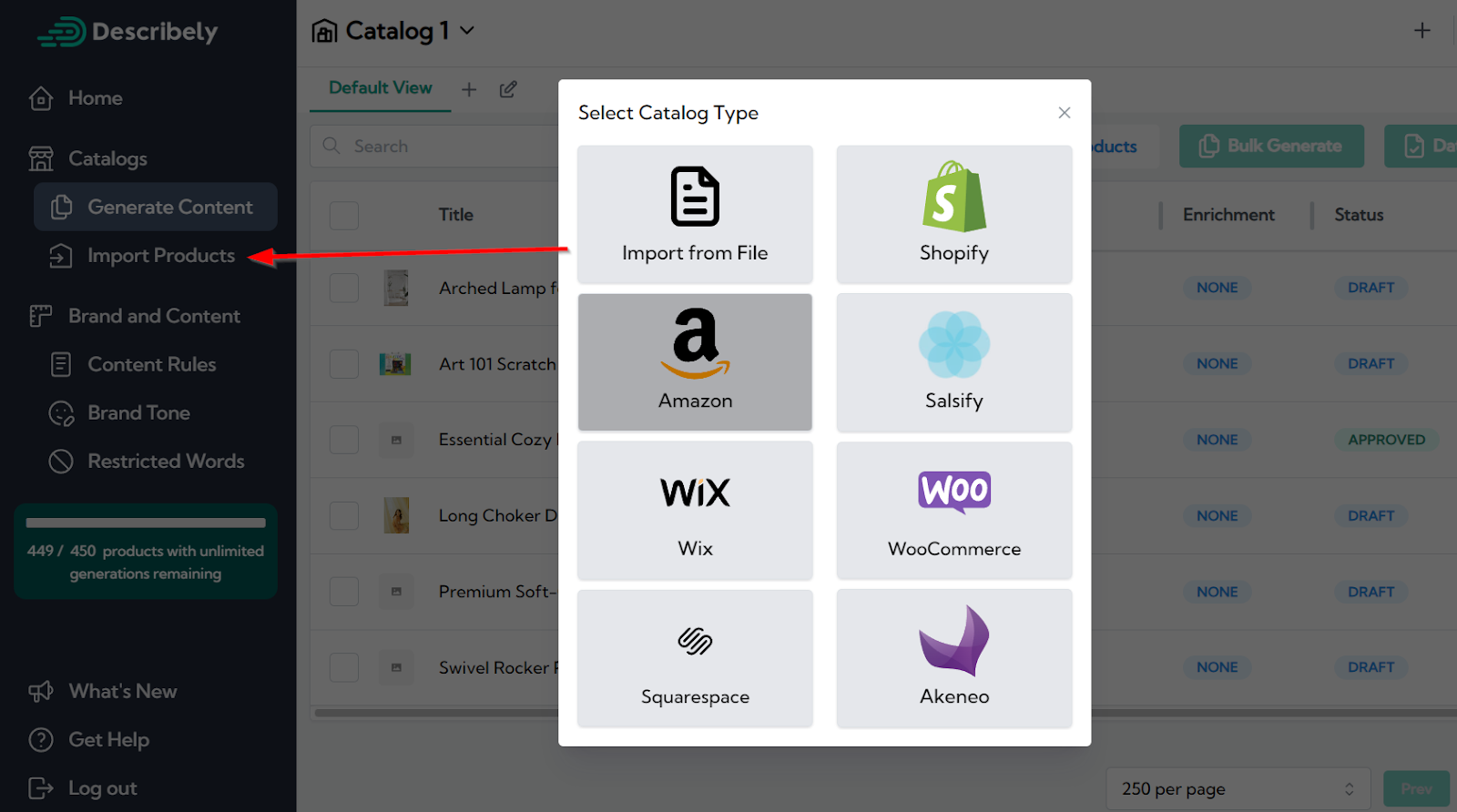
Describely simplifies the process while ChatGPT needs more and more extensions.
Languages
As its popularity grew, ChatGPT started supporting more languages. Some are less accurate than others, however (source: OpenAI):
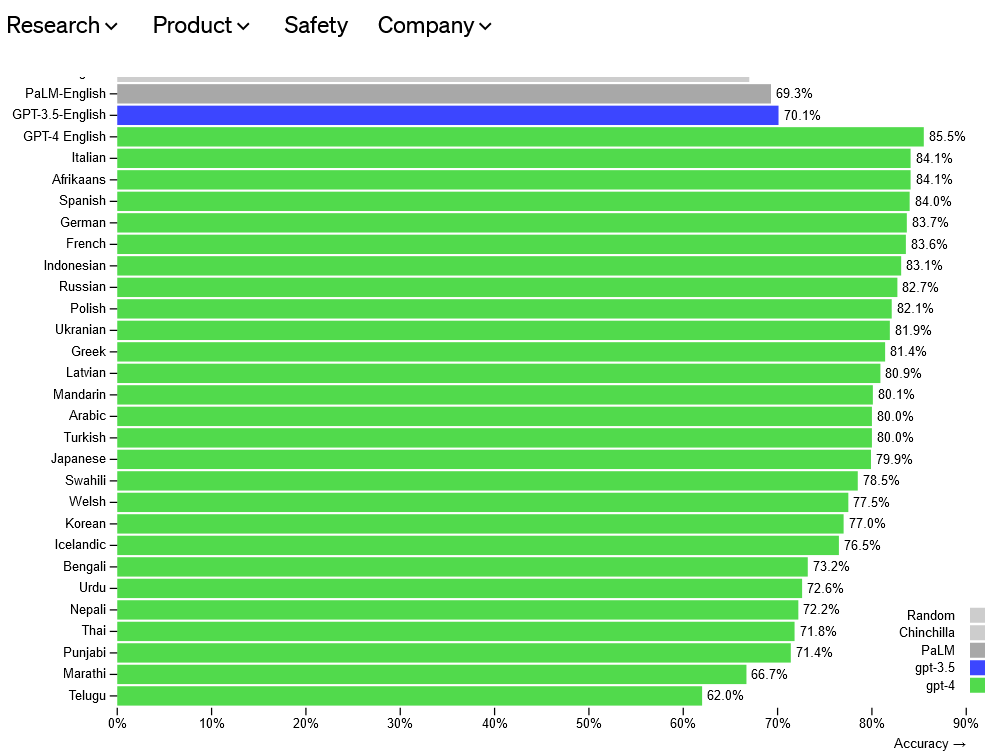
Describely supports 12+ of the most popular languages, both for translating and generating from scratch.
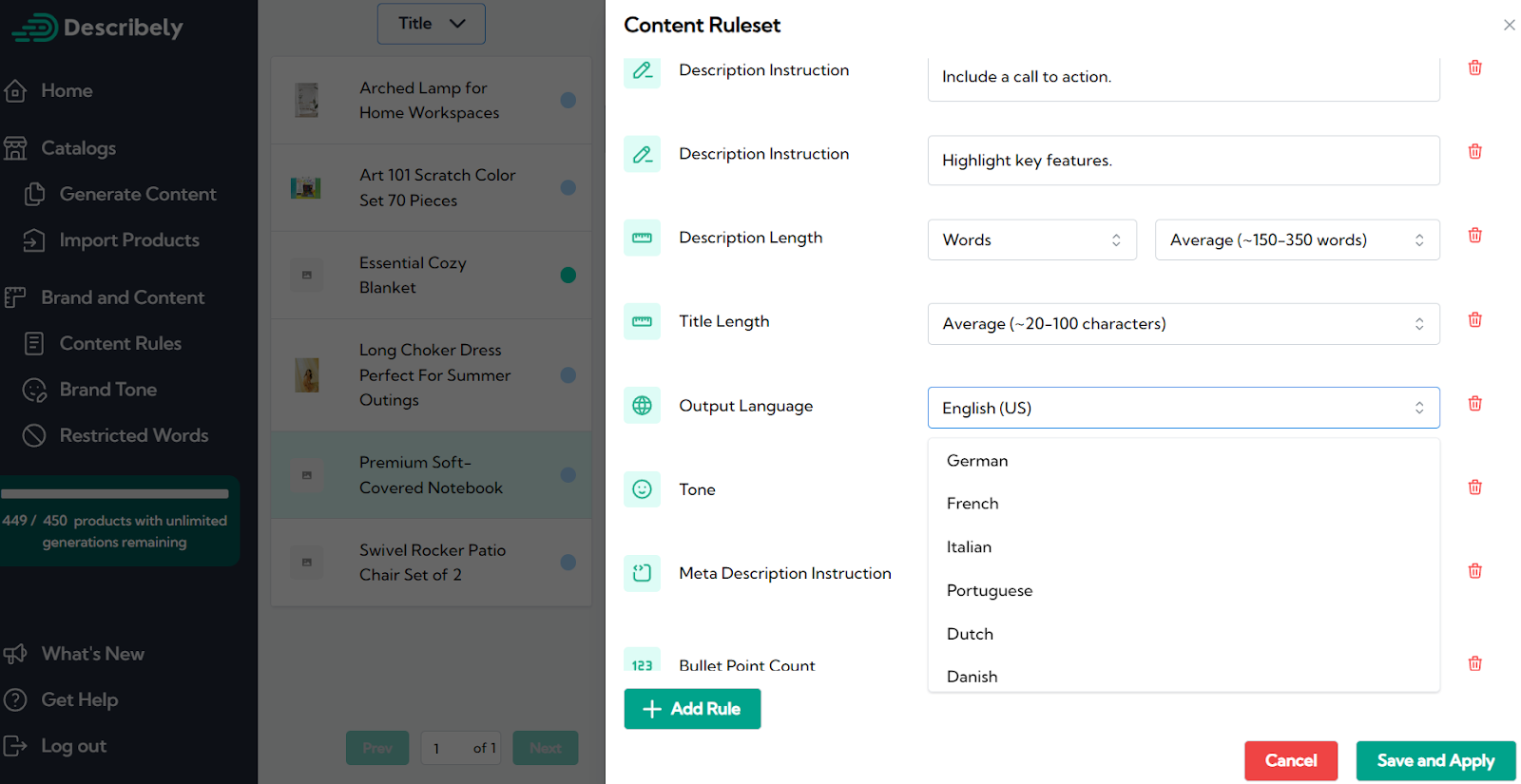
So how can you review product descriptions in a language you don’t know?
Well, that’s why we earlier tested which tool is more reliable at scale. If Describely can consistently write accurate content in English, it can do the same in other languages, whether it translates or rewrites the same features.
Pricing
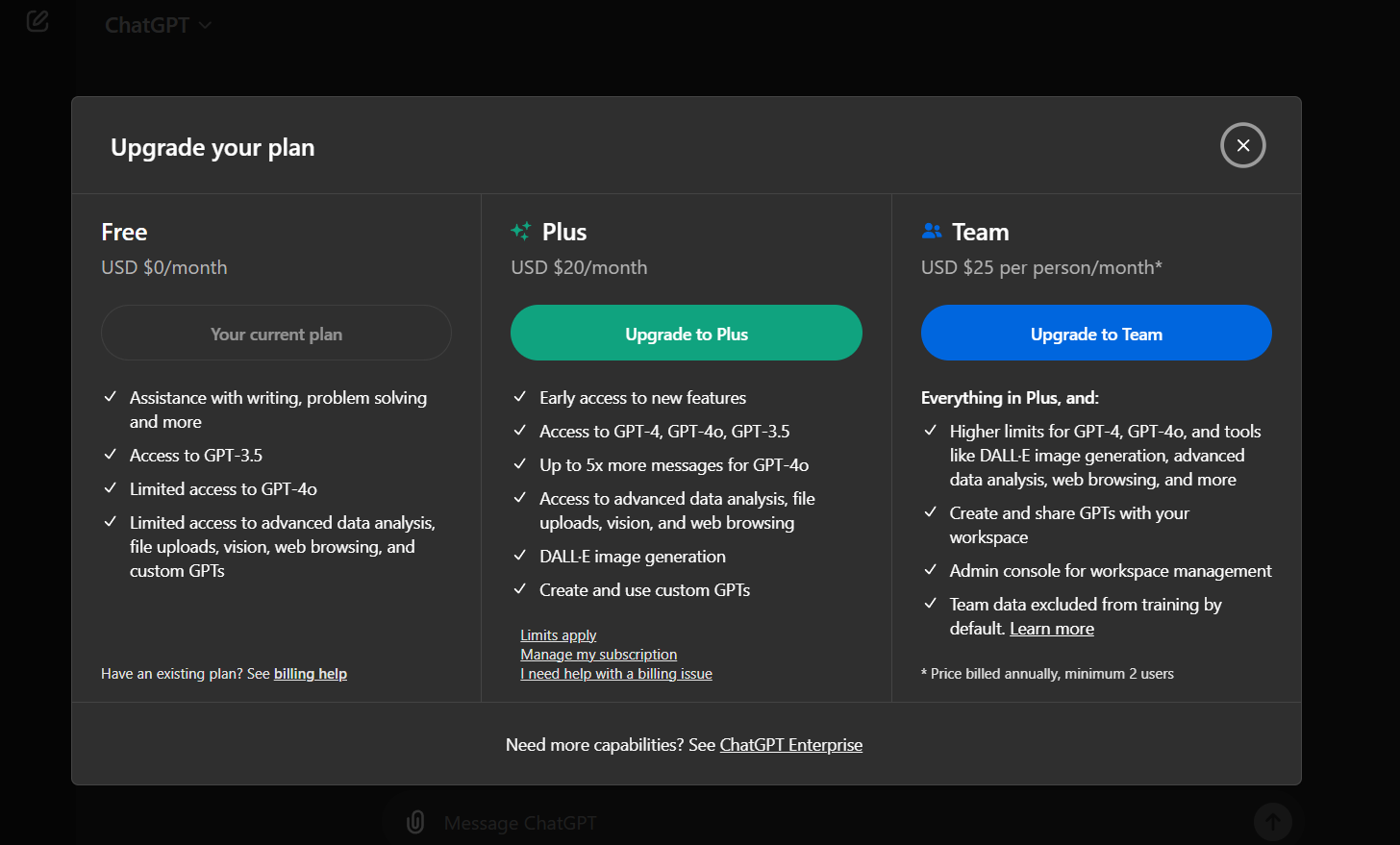
The premium ChatGPT plans come with limitations. For $20 to $25 per month, you get access to the latest models, more messages, and more user seats. You also get other bonuses like custom GPTs, images, web browsing, and video generation, which is a bit overkill when you just need AI product descriptions and data enrichment.
If you have hundreds of products and go with the Team plan, you still don’t get bulk generation due to message limits. And each user seat costs $25/month whereas in Describely they’re unlimited.
Describely’s Pay-As-You-Go pricing offers unmatched flexibility for eCommerce businesses. At just $0.75 per product, you can generate unlimited content, giving you the freedom to scale without being locked into a subscription.
Additionally, you can customize your plan to fit your needs with data enrichment at $0.55 per credit, image processing at $0.05 per credit, and unlimited store connectors. Plus, Describely includes product page SEO tools to help boost your product visibility.
Describely is used by actual eCommerce brands like TargetAU, Marshalls, and Borsheims, which is why it also offers custom enterprise plans upon request.
As for ChatGPT, users have mixed opinions. Hundreds of reviews range from 2.3 to 3.5 stars (averaging ~3 out of 5). Even the good ones aren’t that useful for eCommerce because the ChatGPT experience is very broad.
Meanwhile, verified business owners rate Describely at 4.3 on Capterra and 5 on ProductHunt.
The Verdict: Which One Is the Best for eCommerce Copywriting & Product Descriptions, Describely or ChatGPT?
If you got this far, chances are you used ChatGPT and still didn’t get the results you wanted. Are there better options for eCommerce teams? This comparison shows that Describely can be the best alternative.
As new versions come out, we will keep testing ChatGPT to see how it adapts to product content. As it currently stands, many features are missing that Describely does with ease: bulk generation, custom rulesets, brand voice recognition, editing tools, catalogs, and easy export/import right back to your store.
For teams with clear requirements, Describely is the most complete solution for effortless eCommerce copywriting. You can test it here for free today.

